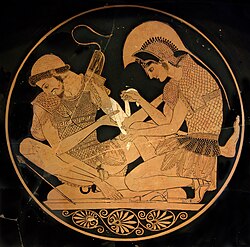
The Trojan War was a legendary conflict in Greek mythology that took place around the 12th or 13th century BC. The war was waged by the Achaeans (Greeks) against the city of Troy after Paris of Troy took Helen from her husband Menelaus, king of Sparta. The war is one of the most important events in Greek mythology, and it has been narrated through many works of Greek literature, most notably Homer's Iliad. The core of the Iliad describes a period of four days and two nights in the tenth year of the decade-long siege of Troy; the Odyssey describes the journey home of Odysseus, one of the war's heroes. Other parts of the war are described in a cycle of epic poems, which have survived through fragments. Episodes from the war provided material for Greek tragedy and other works of Greek literature, and for Roman poets including Virgil and Ovid.
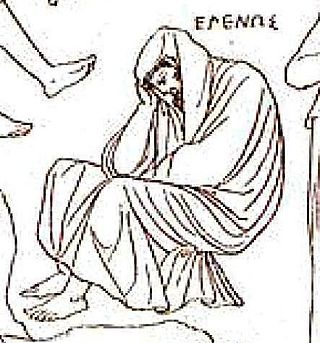
In Greek mythology, Helenus was a gentle and clever seer. He was also a Trojan prince as the son of King Priam and Queen Hecuba of Troy, and the twin brother of the prophetess Cassandra. He was also called Scamandrios, and was a lover of Apollo.

In Greek mythology, Deidamia was a princess of Scyros as a daughter of King Lycomedes.

In Greek mythology, Andromache was the wife of Hector, daughter of Eetion, and sister to Podes. She was born and raised in the city of Cilician Thebe, over which her father ruled. The name means 'man battler' or 'fighter of men' or 'man fighter' or 'man's battle', from the Greek stem ἀνδρ- 'man' and μάχη 'battle'.
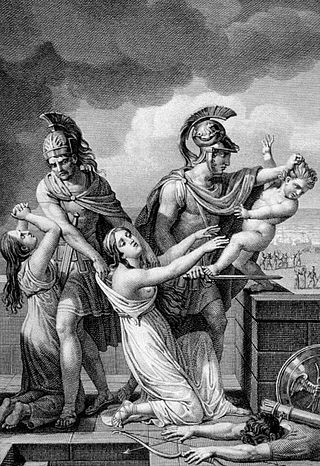
In Greek mythology, Astyanax was the son of Hector, the crown prince of Troy, and his wife, Princess Andromache of Cilician Thebe. His birth name was Scamandrius, but the people of Troy nicknamed him Astyanax, because he was the son of the city's great defender and the heir apparent's firstborn son.
Arctinus of Miletus or Arctinus Milesius was a Greek epic poet whose reputation is purely legendary, as none of his works survive. Traditionally dated between 775 BC and 741 BC, he was said to have been a pupil of Homer. His father was Teleus son of Nauteus. Phaenias of Eresus placed him in the 7th century BC and claimed that he was defeated by Lesches of Pyrrha in competition. One of the "cyclic poets", Arctinus composed the epics Aethiopis and Sack of Troy, which were contributions to the Trojan War cycle, and possibly Naupactia.

The Epic Cycle was a collection of Ancient Greek epic poems, composed in dactylic hexameter and related to the story of the Trojan War, including the Cypria, the Aethiopis, the so-called Little Iliad, the Iliupersis, the Nostoi, and the Telegony. Scholars sometimes include the two Homeric epics, the Iliad and the Odyssey, among the poems of the Epic Cycle, but the term is more often used to specify the non-Homeric poems as distinct from the Homeric ones.

The Aithiopis, also spelled Aethiopis, is the lost epic of ancient Greek literature. It was one of the Epic Cycle, which told the entire history of the Trojan War in epic verse. The story of the Aethiopis lands chronologically after the Homeric Iliad, and could be followed by that of the Little Iliad. The Aethiopis was often attributed by ancient writers to Arctinus of Miletus who lived in the 8th century BC. The poem comprised five books of verse in dactylic hexameter. Very few fragments of the Aethiopis survive today; Proclus's summary of the poems' contents establishes the narrative framework of the epic.
The Little Iliad is a lost epic of ancient Greek literature. It was one of the Epic Cycle, that is, the Trojan cycle, which told the entire history of the Trojan War in epic verse. The story of the Little Iliad comes chronologically after that of the Aethiopis, and is followed by that of the Iliou persis. The Little Iliad was variously attributed by ancient writers to Lesches of Pyrrha, Cinaethon of Sparta, Diodorus of Erythrae, Thestorides of Phocaea, or Homer himself. The poem comprised four books of verse in dactylic hexameter, the heroic meter.
The Nostoi, also known as Returns or Returns of the Greeks, is a lost epic of ancient Greek literature. It was one of the Epic Cycle, that is, the Trojan cycle, which told the entire history of the Trojan War in epic verse. The story of the Nostoi comes chronologically after that of the Iliupersis, and is followed by that of the Odyssey. The author of the Nostoi is uncertain; ancient writers attributed the poem variously to Agias, Homer, and Eumelos of Corinth. The poem comprised five books of verse in dactylic hexameter. The word nostos means "return home".
The Telegony is a lost ancient Greek epic poem about Telegonus, son of Odysseus by Circe. His name is indicative of his birth on Aeaea, far from Odysseus' home of Ithaca. It was part of the Epic Cycle of poems that recounted the myths of the Trojan War as well as the events that led up to and followed it. The story of the Telegony comes chronologically after that of the Odyssey and is the final episode in the Epic Cycle. The poem was sometimes attributed in antiquity to Cinaethon of Sparta, but in one source it is said to have been stolen from Musaeus by Eugamon or Eugammon of Cyrene. The poem comprised two books of verse in dactylic hexameter.
The Cypria is a lost epic poem of ancient Greek literature, which has been attributed to Stasinus and was quite well known in classical antiquity and fixed in a received text, but which subsequently was lost to view. It was part of the Epic Cycle, which told the entire history of the Trojan War in epic hexameter verse. The story of the Cypria comes chronologically at the beginning of the Epic Cycle, and is followed by that of the Iliad; the composition of the two was apparently in the reverse order. The poem comprised eleven books of verse in epic dactylic hexameters.
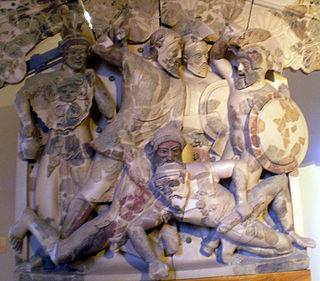
The Theban Cycle is a collection of four lost epics of ancient Greek literature which tells the mythological history of the Boeotian city of Thebes. They were composed in dactylic hexameter verse and believed to be recorded between 750 and 500 BC. The epics took place before the Trojan War and centered around the Theban royal family.
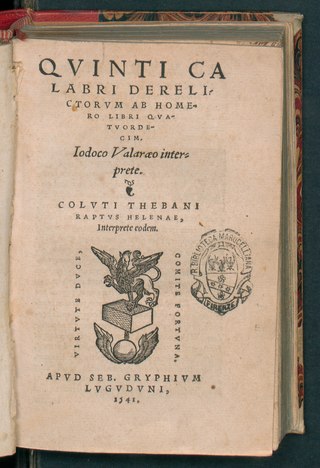
The Posthomerica is an epic poem in Greek hexameter verse by Quintus of Smyrna. Probably written in the 3rd century AD, it tells the story of the Trojan War, between the death of Hector and the fall of Ilium (Troy). The poem is an abridgement of the events described in the epic poems Aethiopis and Iliou Persis by Arctinus of Miletus, and the Little Iliad by Lesches, all now-lost poems of the Epic Cycle.
Cinaethon of Sparta was a legendary Greek poet to whom different sources ascribe the lost epics Oedipodea, Little Iliad and Telegony. Eusebius says that he flourished in 764–3 BC.
Epigoni was an early Greek epic, a sequel to the Thebaid and therefore grouped in the Theban cycle. Some ancient authors seem to have considered it a part of the Thebaid and not a separate poem.

The Thebaid or Thebais, also called the Cyclic Thebaid, is an Ancient Greek epic poem of uncertain authorship sometimes attributed by early writers to Homer, for example, by the poet Callinus and the historian Herodotus. It told the story of the war between the brothers Eteocles and Polynices, and was regarded as forming part of a Theban Cycle. Only fragments of the text survive.
The Alcmeonis is a lost early Greek epic which is considered to have formed part of the Theban cycle. There are only seven references to the Alcmeonis in ancient literature, and all of them make it clear that the authorship of the epic was unknown. It told the story of Alcmaeon's killing of his mother Eriphyle for having arranged the death of his father Amphiaraus, whose murder was narrated in the Thebaid. One of the surviving fragments is quoted by Athenaeus in the Deipnosophistae: he chose it because it describes a funeral banquet. The lines have very little in common with descriptions of feasts in the Iliad and Odyssey.
The Oedipodea is a lost poem of the Theban cycle, a part of the Epic Cycle. The poem was about 6,600 verses long and the authorship was credited by ancient authorities to Cinaethon (Κιναίθων), a barely-known poet who probably lived in Sparta. Eusebius says that he flourished in 764/3 BC. Only three short fragments and one testimonium survived.

In Greek mythology, Eurypylus ("Broadgate") was the son of Telephus, king of Mysia. He was a great warrior, who led a Mysian contingent that fought alongside the Trojans against the Greeks in the Trojan War. He killed Machaon, and was himself killed by Achilles' son Neoptolemus.

